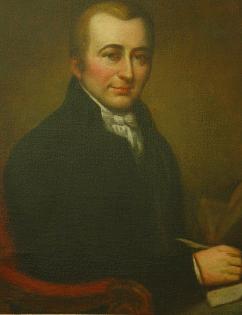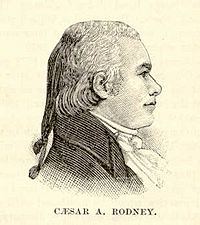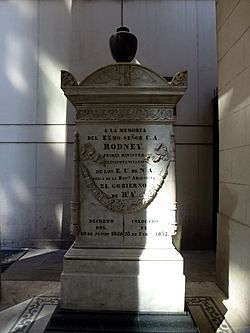Caesar Augustus Rodney facts for kids
Quick facts for kids
Caesar Rodney
|
|
|---|---|
 |
|
| United States Minister to Argentina | |
| In office December 27, 1823 – June 10, 1824 |
|
| President | James Monroe |
| Preceded by | Position established |
| Succeeded by | John Forbes (Acting) |
| United States Senator from Delaware |
|
| In office January 24, 1822 – January 29, 1823 |
|
| Preceded by | Outerbridge Horsey |
| Succeeded by | Thomas Clayton |
| Member of the U.S. House of Representatives from Delaware's at-large district |
|
| In office March 4, 1821 – January 24, 1822 2nd seat |
|
| Preceded by | Willard Hall |
| Succeeded by | Daniel Rodney |
| In office March 4, 1803 – March 3, 1805 Sole seat |
|
| Preceded by | James Bayard |
| Succeeded by | James M. Broom |
| 6th United States Attorney General | |
| In office January 20, 1807 – December 5, 1811 |
|
| President | Thomas Jefferson James Madison |
| Preceded by | John Breckinridge |
| Succeeded by | William Pinkney |
| Personal details | |
| Born | January 4, 1772 Dover, Delaware Colony, British America |
| Died | June 10, 1824 (aged 52) Buenos Aires, United Provinces of the Río de la Plata |
| Political party | Democratic-Republican |
| Spouse | Susan Hunn |
| Education | University of Pennsylvania (BA) |
Caesar Augustus Rodney (born January 4, 1772 – died June 10, 1824) was an important American lawyer and politician from Wilmington. He was a member of the Democratic-Republican Party. He served in many important roles, including as a U.S. Representative and U.S. Senator for Delaware. He was also the U.S. Attorney General and a U.S. Minister (like an ambassador) to Argentina.
Contents
Who Was Caesar Augustus Rodney?
Early Life and Family Connections
Caesar Augustus Rodney was born in Dover, which was then a British colony. His parents were Thomas Rodney and Elizabeth Fisher. He was the nephew of a very famous person, Caesar Rodney, who signed the Declaration of Independence. You might even recognize his uncle from the Delaware state quarter!
Caesar Augustus went to the University of Pennsylvania and graduated in 1789. After that, he studied law and became a lawyer in 1793. He practiced law in Wilmington and New Castle, Delaware. He married Susan Hunn, and they lived in a home called "Cool Springs" in Wilmington.
What Did Rodney Do in Politics?
Starting His Political Journey
Rodney began his political career in the Delaware General Assembly. He served as a State Representative for six terms, from 1797 to 1802. During this time, he became a key leader of the Jeffersonian party, which is now known as the Democratic-Republican Party.
Serving in the U.S. House
In 1802, Thomas Jefferson encouraged Rodney to run for the U.S. House. He won a close election against James A. Bayard. Even though they were political rivals, they remained good friends.
While in the U.S. House, Rodney was part of the Committee on Ways and Means. He also gained national attention for his role in important legal cases.
Leading Impeachment Cases
In 1804, Rodney was chosen to help prepare the articles of impeachment against John Pickering. Pickering was a judge charged with acting improperly. This case helped show how important it is to hold judges accountable.
Later that same year, Rodney also led another impeachment case against Samuel Chase. Chase was an Associate Justice of the Supreme Court of the United States. These cases were about making sure government officials followed the rules.
Rodney served one term in the U.S. House from 1803 to 1805. He ran for reelection in 1804 but was defeated by James A. Bayard.
Becoming the U.S. Attorney General
On January 20, 1807, President Thomas Jefferson chose Rodney to be the U.S. Attorney General. This job means he was the chief lawyer for the U.S. government. He continued in this role for the rest of Jefferson's presidency and for almost three years under President James Madison.
As Attorney General, Rodney was part of the team that prosecuted former Vice-President Aaron Burr in his second treason trial. Rodney resigned from his position on December 5, 1811.
Serving in the War of 1812
During the War of 1812, Rodney became a captain. He led a rifle corps, which later became the Delaware 1st Artillery. They helped defend Fort Union in Wilmington and also assisted in the defense of Baltimore in 1814.
Rodney's Later Political Life
Returning to Congress
After his time as Attorney General, Rodney returned to politics. He served in the Delaware State Senate from 1815 to 1817. In 1820, he was elected to the U.S. House again. He served there until 1822, when he resigned to become a U.S. Senator. He was Delaware's only Democratic-Republican U.S. Senator at that time. He resigned from the Senate in 1823 for a new diplomatic role.
Diplomatic Mission to South America
In 1817, President James Monroe selected Rodney for a special diplomatic mission to South America. Rodney was chosen to lead a group to investigate whether the newly formed South American republics should be recognized as independent nations.
Rodney strongly believed these new countries should be recognized. In 1819, he published his findings in a report called Reports on the Present State of the United Provinces of South America. This report greatly influenced the ideas behind the Monroe Doctrine. The Monroe Doctrine was a U.S. policy that warned European powers not to interfere in the Americas.
Because of his work, Rodney was appointed as the United States Minister Plenipotentiary to the United Provinces of the Río de la Plata (which is now Argentina) in 1823. He stayed in this important role until his death.
Death and Lasting Impact
Rodney passed away on June 10, 1824, in Buenos Aires, Argentina. He was buried there in the Victoria district British Cemetery. Later, his remains were moved to a crypt at St. John's Cathedral in Buenos Aires.
Places with More Information
- Delaware Historical Society; website; 505 North Market Street, Wilmington, Delaware 19801; (302) 655-7161
- University of Delaware; Library website; 181 South College Avenue, Newark, Delaware 19717; (302) 831–2965
| United States House of Representatives | ||
|---|---|---|
| Preceded by N/A |
Member of the U.S. House of Representatives from Delaware's at-large congressional district March 4, 1821 – January 24, 1822 |
Succeeded by N/A |
| United States Senate | ||
| Preceded by Outerbridge Horsey |
Senator from Delaware 1822–1823 |
Succeeded by Thomas Clayton |
| Diplomatic posts | ||
| New title newly independent
|
U.S. Minister to Argentina December 27, 1823 – June 10, 1824 |
Succeeded by John M. Forbes |
See also
 In Spanish: Caesar Augustus Rodney para niños
In Spanish: Caesar Augustus Rodney para niños
 | Kyle Baker |
 | Joseph Yoakum |
 | Laura Wheeler Waring |
 | Henry Ossawa Tanner |



